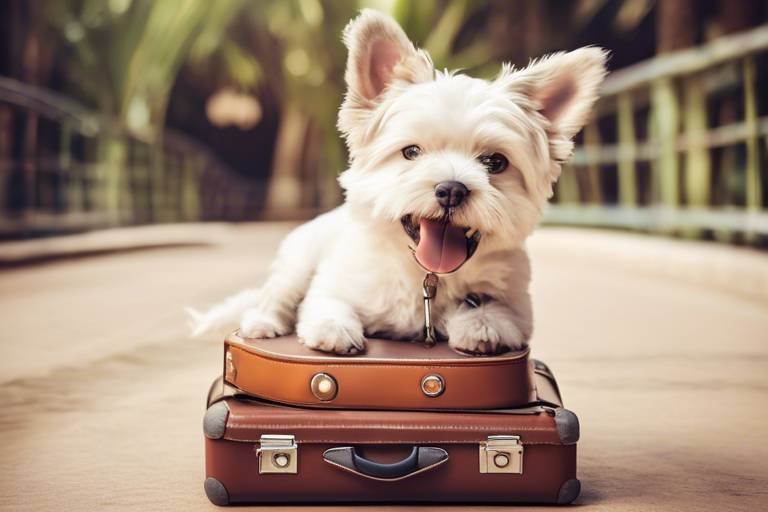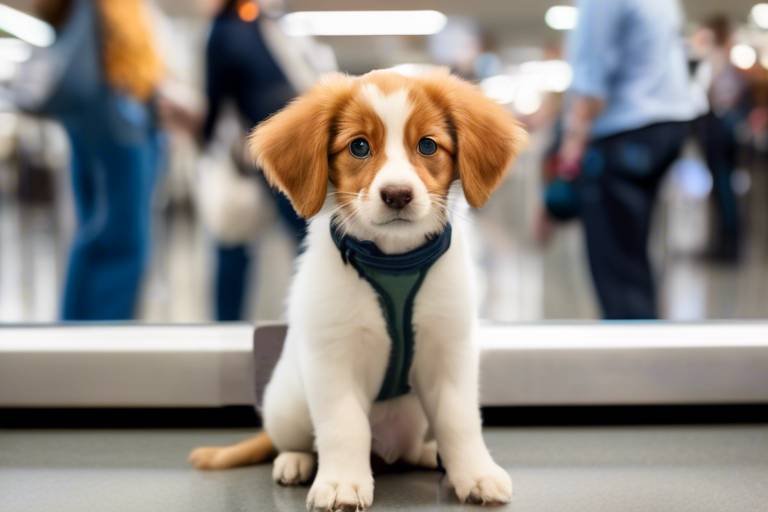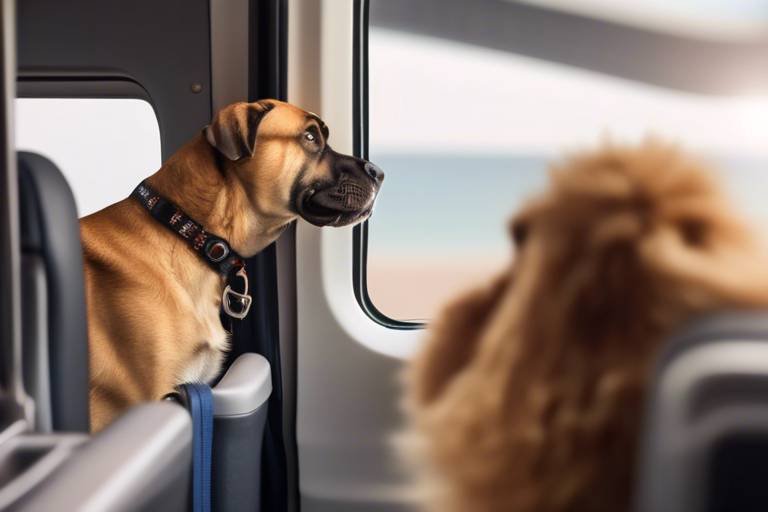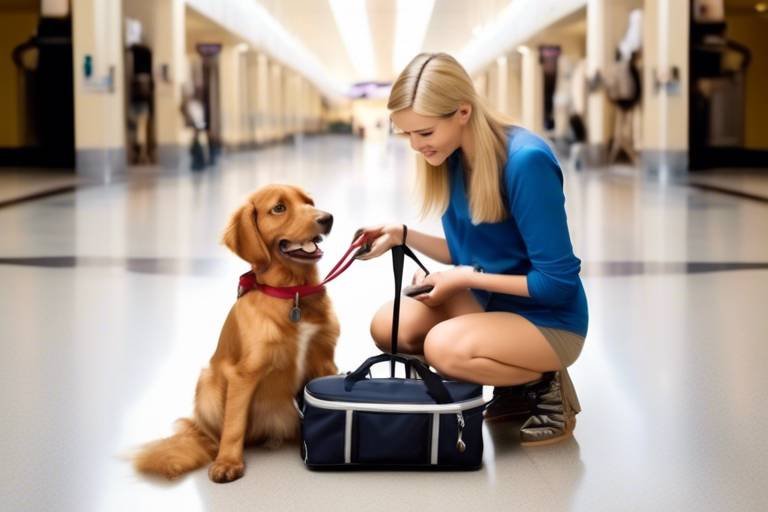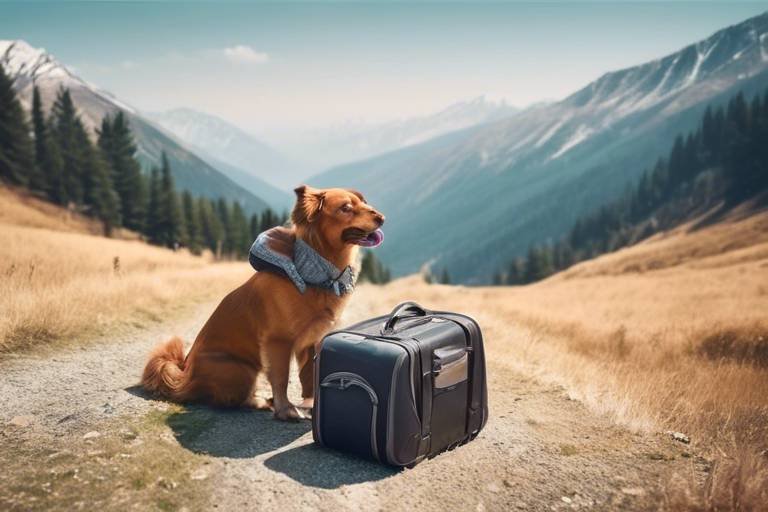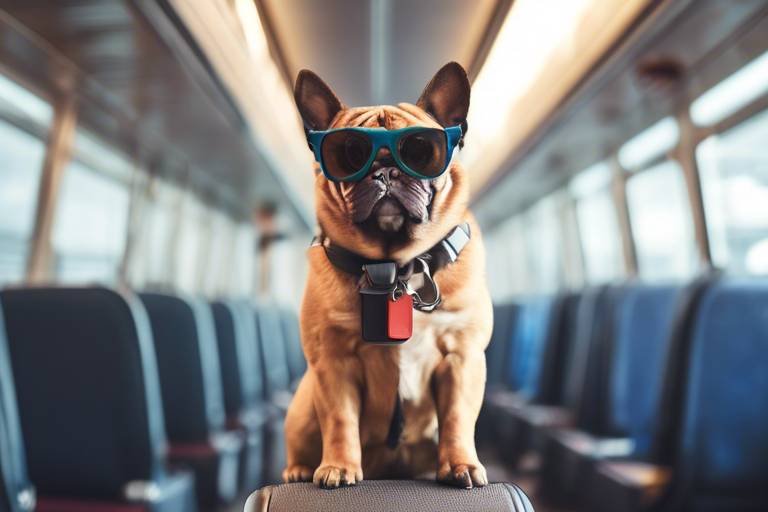The Importance of Pet-Friendly Travel Policies
In today's fast-paced world, where people often seek to explore new horizons, the notion of travel has evolved significantly. It's no longer just about discovering new places but also about enjoying those experiences with our beloved furry companions. Pet-friendly travel policies have emerged as a vital aspect of the travel industry, catering to the growing demand for inclusive travel experiences that allow pet owners to bring their pets along. This article delves into the significance of these policies, highlighting their myriad benefits for travelers, businesses, and, most importantly, the pets themselves.
As pet ownership continues to rise, so does the desire for travel options that accommodate our four-legged friends. Imagine embarking on a road trip without the worry of leaving your dog behind or booking a hotel that welcomes your cat with open arms. The emotional bond between pets and their owners is profound, and the ability to travel together enhances that connection. Moreover, pet-friendly policies not only cater to the needs of pet owners but also create a welcoming atmosphere for all guests, fostering a sense of community and inclusivity.
Consider this: when you travel with your pet, you’re not just bringing along an animal; you’re bringing a part of your family. This shift in mindset has led to a surge in businesses recognizing the importance of adapting to these changing customer expectations. From hotels offering pet amenities to airlines providing special accommodations, the landscape of travel is evolving to embrace the idea that pets are not just animals but cherished companions deserving of care and consideration.
Furthermore, implementing pet-friendly travel policies can lead to a significant economic impact. Businesses that cater to pet owners often experience increased bookings, customer loyalty, and a competitive edge in the market. By embracing this trend, companies can tap into a lucrative segment of the travel industry, ultimately benefiting their bottom line while also enhancing the travel experience for pet owners.
In conclusion, the importance of pet-friendly travel policies cannot be overstated. They represent a shift towards more inclusive travel experiences that acknowledge the deep bond between pets and their owners. As we continue to explore new destinations, let’s ensure that our furry friends can join us on our adventures, enriching our journeys and creating lasting memories together.

Understanding Pet-Friendly Travel
Pet-friendly travel is not just a trend; it's a revolution in how we experience the world with our furry companions. Imagine embarking on a journey where your four-legged friend is not only welcomed but celebrated. This growing movement recognizes that pets are family members, and their presence can enhance the travel experience for everyone involved. As more travelers seek to include their pets in their adventures, accommodations and transportation options are adapting to meet this demand.
The concept of pet-friendly travel encompasses a wide range of services and amenities designed to ensure that both pets and their owners have an enjoyable experience. From hotels that offer special pet packages to airlines that allow pets in the cabin, there are countless options available. This shift in the travel industry is not merely about allowing pets; it's about creating an atmosphere where pets are treated with the same care and consideration as their human counterparts.
One of the key drivers behind this trend is the changing demographics of pet ownership. According to recent studies, over 67% of U.S. households own a pet, and this number continues to rise. With pet ownership becoming more prevalent, travelers are increasingly looking for ways to include their pets in their travel plans. This desire for companionship during trips is not just about having a pet by your side; it’s about the emotional support they provide, reducing feelings of loneliness and anxiety while away from home.
Moreover, pet-friendly travel policies can significantly enhance the travel experience. For example, many hotels now offer pet-friendly amenities such as dog beds, pet bowls, and even treats at check-in. This thoughtful approach not only makes pets feel more at home but also allows their owners to relax and enjoy their stay without worrying about their pets' well-being. The benefits of traveling with pets extend beyond comfort; they also include the opportunity to explore pet-friendly destinations, from parks to beaches, creating lasting memories together.
As this trend continues to grow, it’s essential for travelers to have a clear understanding of what pet-friendly travel entails. Here are a few aspects to consider:
- Accommodations: Look for hotels, motels, and vacation rentals that explicitly advertise pet-friendly policies.
- Transportation: Check the regulations of airlines, trains, and other travel services regarding pet travel.
- Activities: Research pet-friendly attractions and activities at your destination to ensure a fun-filled experience for both you and your pet.
In conclusion, understanding pet-friendly travel is about embracing the joy and companionship that pets bring into our lives. As more businesses recognize the importance of catering to pet owners, the travel landscape is evolving to be more inclusive. This transformation not only benefits travelers and their pets but also enriches the overall travel experience, making it more enjoyable and memorable for all involved.

Benefits for Travelers
Traveling with your beloved pet can transform an ordinary trip into an extraordinary adventure. Imagine the joy of exploring new destinations with your furry companion by your side, creating memories that last a lifetime. The benefits of pet-friendly travel policies extend far beyond mere convenience; they enhance the overall travel experience for both pets and their owners. For many pet owners, leaving their pets behind can lead to feelings of guilt and anxiety. However, with the right travel accommodations, these concerns can be alleviated.
One of the most significant advantages of traveling with pets is the companionship they provide. Pets are not just animals; they are family members who offer unconditional love and support. Having your pet with you can help reduce travel-related stress and anxiety, making the journey more enjoyable. Studies have shown that pets can have a calming effect on their owners, which can be particularly beneficial in unfamiliar environments.
Moreover, pet-friendly travel policies can lead to increased bonding time between pets and their owners. Instead of worrying about their well-being in a kennel or with a pet sitter, owners can engage in activities together, such as hiking, exploring parks, or relaxing on the beach. This shared experience not only strengthens the bond but also provides pets with the stimulation they need to stay healthy and happy.
Another noteworthy benefit is the increased flexibility that comes with pet-friendly travel. Many accommodations now offer amenities specifically designed for pets, such as dog parks, pet-friendly dining options, and even spa services for furry friends. This flexibility allows travelers to plan their itineraries without the constraints of finding pet sitters or worrying about their pet's care. Imagine enjoying a delightful meal at a restaurant that welcomes pets, or relaxing in a hotel that provides pet beds and treats!
Additionally, pet-friendly travel can lead to a more inclusive experience for everyone involved. As more businesses adopt pet-friendly policies, they create an environment that caters to a growing demographic of pet owners. This inclusivity not only enhances customer satisfaction but also fosters a sense of community among travelers who share a love for their pets.
In conclusion, the benefits of pet-friendly travel policies are vast and varied. From reducing anxiety and enhancing companionship to providing greater flexibility and inclusivity, these policies cater to the needs of modern travelers. As the demand for pet-friendly options continues to grow, businesses that embrace these policies will undoubtedly attract a loyal customer base eager to explore the world with their four-legged companions.

Economic Impact on Businesses
In today’s competitive travel industry, businesses are constantly seeking innovative ways to attract customers and boost their revenue. One of the most effective strategies has been the adoption of pet-friendly travel policies. As the number of pet owners continues to rise, accommodating furry companions is no longer just a nice-to-have; it’s a necessity for businesses looking to thrive. By welcoming pets, companies can tap into a lucrative market segment that values inclusivity and flexibility in their travel experiences.
Consider this: a family planning a vacation is likely to include their beloved dog or cat in the itinerary. If they find a hotel that accepts pets, their likelihood of booking that accommodation skyrockets. In fact, studies have shown that pet-friendly establishments often enjoy higher occupancy rates compared to those that do not allow pets. This increase in bookings translates to substantial economic benefits for hotels, airlines, and other travel-related businesses.
Moreover, pet-friendly policies can lead to enhanced customer loyalty. When travelers have positive experiences with their pets, they are more likely to return to the same business in the future. This loyalty not only boosts repeat business but also encourages word-of-mouth referrals, which can be a powerful marketing tool. Pet owners are often vocal about their experiences, sharing them on social media and travel review platforms, which can significantly enhance a business's reputation.
Additionally, let’s not overlook the potential for increased spending. Pet owners are willing to spend more on services that cater to their pets. For instance, hotels that provide pet amenities such as pet beds, food bowls, and even pet-sitting services can charge a premium for these offerings. This not only elevates the guest experience but also contributes to the bottom line. A recent survey revealed that pet owners are willing to pay up to 20% more for pet-friendly accommodations compared to non-pet-friendly options.
To illustrate the economic impact further, let’s take a look at a simple table that outlines the potential revenue increase for businesses that implement pet-friendly policies:
| Business Type | Average Increase in Revenue | Customer Loyalty Boost |
|---|---|---|
| Hotels | 15-20% | 30% more repeat customers |
| Airlines | 10-15% | 25% more bookings |
| Car Rentals | 5-10% | 20% more customer referrals |
As we can see, the economic impact of pet-friendly policies extends beyond just increased bookings. It fosters a loyal customer base, encourages repeat business, and opens doors for additional revenue streams through premium services. For businesses looking to stay ahead in a rapidly evolving market, embracing pet-friendly travel policies is not just a trend; it’s a smart business strategy that can yield substantial returns.
In conclusion, the economic benefits of adopting pet-friendly policies are clear. As the travel landscape continues to evolve, businesses that prioritize the needs of pet owners will not only enhance their customer experience but also secure a competitive edge in the industry. So, why not take the leap and create a welcoming environment for our furry friends? The rewards could be more significant than you ever imagined!
- What are the typical policies for pet-friendly hotels? Most pet-friendly hotels allow pets for an additional fee and have specific guidelines regarding size, breed, and number of pets.
- Are there any additional costs associated with traveling with pets? Yes, many accommodations charge pet fees, and airlines may have specific charges for pet travel.
- How can businesses ensure a positive experience for pet owners? By providing pet amenities, clear guidelines, and ensuring a safe environment for both pets and guests.

Health and Well-Being of Pets
When it comes to traveling with our furry companions, one of the most crucial aspects to consider is their health and well-being. Just like us, pets can experience stress and anxiety when faced with new environments, unfamiliar sounds, and changes in routine. This is where pet-friendly travel policies play a significant role in ensuring that our four-legged friends remain happy and healthy during our adventures.
Traveling can be a whirlwind of excitement, but for pets, it can also be overwhelming. Imagine being uprooted from your cozy home, placed in a car or airplane, and whisked away to a completely different place. It’s no wonder that many pets can feel anxious during travel. However, when businesses implement pet-friendly policies, they create an environment that minimizes stress for animals. This can include offering designated pet areas, providing calming products, and even having staff trained to handle pets with care.
Moreover, having the ability to travel with pets can lead to improved mental health for both the pet and the owner. Pets are known to provide companionship and emotional support, which can be incredibly beneficial during travel. The presence of a beloved pet can alleviate feelings of loneliness and anxiety, making the trip more enjoyable for everyone involved. It’s like having a little piece of home wherever you go!
Another vital aspect of pet-friendly travel is ensuring that pets have access to necessary resources. This includes:
- Proper hydration: Businesses should provide water bowls or easy access to water for pets.
- Safe spaces: Designated areas where pets can relax and feel secure can significantly reduce their stress levels.
- Exercise opportunities: Access to outdoor spaces or parks allows pets to stretch their legs and burn off some energy.
By addressing these needs, businesses not only enhance the travel experience for pets but also promote their overall welfare. A happy pet is a well-behaved pet, and when pets are comfortable, they are less likely to exhibit stress-related behaviors such as barking, scratching, or hiding. This leads to a more pleasant experience for all travelers, ensuring that both pets and their owners can enjoy their time away from home.
Furthermore, it’s essential to recognize that the responsibility doesn’t solely lie with the businesses. Pet owners must also prepare their pets for travel. This preparation can include familiarizing pets with their carriers, ensuring they are comfortable with car rides, and even consulting with a veterinarian if necessary. The combination of proactive pet owner behavior and accommodating business policies creates a harmonious travel experience.
In conclusion, adopting pet-friendly travel policies is not just a trend; it’s a necessary evolution in the travel industry that prioritizes the health and happiness of pets. As more travelers seek inclusive experiences that allow them to bring their pets along, businesses that recognize and adapt to this demand will not only enhance the well-being of animals but also foster loyalty among pet owners. After all, a happy pet makes for a happy trip!
Q1: What should I do if my pet gets anxious during travel?
A1: Consider using calming products, taking breaks during long trips, and ensuring your pet has a familiar blanket or toy to help them feel secure.
Q2: Are there any specific breeds that are better suited for travel?
A2: While all pets can travel, smaller breeds often adapt more easily due to their size. However, each pet is unique, and it’s essential to consider their personality and comfort level.
Q3: How can I find pet-friendly accommodations?
A3: Many travel websites now offer filters for pet-friendly options. Additionally, calling ahead to confirm policies can ensure a smooth experience.

Legal Considerations
When it comes to implementing pet-friendly travel policies, understanding the legal landscape is crucial for businesses. Companies that choose to welcome pets must navigate a myriad of regulations that vary by location, industry, and even the type of pet. For instance, some regions have specific laws regarding the types of animals allowed in public spaces, while others may enforce health and safety standards that must be adhered to. It's essential for businesses to conduct thorough research and consult legal experts to ensure compliance with local, state, and federal regulations.
One key aspect of these legal considerations is liability. Businesses must consider what happens if a pet causes damage or injury while on their premises. To mitigate risks, it’s advisable to implement clear policies that outline the responsibilities of pet owners. This can include requiring pet owners to keep their pets leashed or crated in certain areas, as well as obtaining liability waivers that protect the business from potential claims. Additionally, providing training for staff on how to handle interactions with pets and their owners can further safeguard against legal issues.
Moreover, businesses should also be aware of health regulations that pertain to animals in public spaces. For example, restaurants and hotels may need to adhere to specific health codes that dictate how pets can be accommodated without compromising hygiene standards. In some cases, businesses might be required to provide designated pet areas that are separate from human guests to ensure a safe and clean environment for everyone.
It's also important to consider the implications of service animals versus emotional support animals. While service animals are specifically trained to assist individuals with disabilities and are protected under the Americans with Disabilities Act (ADA), emotional support animals do not have the same legal standing. This distinction can lead to confusion among businesses and customers alike. To avoid misunderstandings, clear communication about the types of pets allowed and the policies governing their presence is essential. Businesses should provide educational materials to staff and guests to clarify these differences.
In summary, navigating the legal considerations of pet-friendly travel policies requires diligence and foresight. By taking proactive steps to understand and comply with relevant laws, businesses can create a welcoming atmosphere for pet owners while minimizing potential legal risks. This not only enhances the travel experience for customers but also establishes a reputation for being responsible and accommodating in the growing pet-friendly travel market.
- What are the key legal considerations for businesses offering pet-friendly travel? Businesses must understand local regulations, liability issues, and health codes to ensure compliance and safety.
- Are emotional support animals treated the same as service animals under the law? No, service animals have specific protections under the ADA, while emotional support animals do not have the same legal rights.
- How can businesses protect themselves from liability concerning pets? Implementing clear policies, obtaining liability waivers, and training staff can help mitigate risks associated with pet-related incidents.
- What should businesses do if a pet causes damage or injury? Having a clear policy in place that outlines the responsibilities of pet owners can help address such situations effectively.

Creating a Pet-Friendly Environment
Creating a pet-friendly environment is essential for businesses that want to attract and retain customers who travel with their furry companions. Imagine walking into a hotel where your pet is not just tolerated but welcomed with open arms. This warm atmosphere not only makes you feel at home but also ensures that your pet enjoys the stay as much as you do. To achieve this, businesses must consider several key factors that can transform their spaces into pet-friendly havens.
First and foremost, designing spaces that are safe and comfortable for pets is crucial. This means ensuring that common areas are free from hazards that could endanger pets, such as sharp corners, toxic plants, or small items that can be swallowed. Additionally, providing designated pet areas, such as pet relief stations or outdoor spaces, can make a significant difference. These areas should be equipped with waste disposal stations and clean-up supplies, ensuring that pet owners can maintain cleanliness while enjoying their time.
Moreover, businesses should consider the furniture and layout of their spaces. Using durable, easy-to-clean materials for flooring and upholstery can help manage the wear and tear that comes with accommodating pets. For instance, a hotel lobby with tiled floors and removable cushions can withstand the occasional muddy paw print, making it easier to maintain a clean and inviting space. Additionally, creating cozy corners with pet beds or blankets can encourage pets to relax, making the environment feel even more welcoming.
Another vital aspect is staff training. Employees should be well-versed in handling pets and understanding their needs. This means knowing how to approach a nervous dog or recognizing when a cat needs a quiet space. A friendly, knowledgeable staff can enhance the overall experience for both the pet and the owner. Consider implementing a pet ambassador program, where certain staff members are designated as pet-friendly specialists, ready to assist guests with their furry friends.
Incorporating pet-friendly amenities can also elevate the experience. Offering pet treats at check-in, providing food and water bowls, or even having a pet menu can make a significant impact. Some businesses have gone a step further by offering pet-sitting services, grooming, or even spa treatments for pets. These thoughtful touches not only make a stay more enjoyable but also demonstrate a commitment to the well-being of pets.
Finally, communication is key. Clearly displaying pet policies and guidelines can set expectations for all guests. This could include information about pet sizes allowed, any additional fees, and rules regarding pets in common areas. A well-structured policy ensures that all guests, both pet owners and non-pet owners, feel comfortable and respected during their stay.
By focusing on these aspects, businesses can create an inviting atmosphere that embraces pet owners and their companions. The goal is to foster a sense of community where pets are not just an afterthought but a valued part of the travel experience. As the demand for pet-friendly options continues to grow, those businesses that prioritize creating a welcoming environment will undoubtedly stand out in the competitive travel industry.
- What are the benefits of creating a pet-friendly environment? A pet-friendly environment enhances customer satisfaction, attracts more guests, and promotes a positive brand image.
- How can businesses ensure the safety of pets on their premises? By eliminating hazards, providing designated pet areas, and using durable materials, businesses can create a safe environment for pets.
- What amenities should be offered to pets? Amenities like pet treats, food bowls, and even pet-sitting services can significantly improve the experience for pet owners.
- How important is staff training in a pet-friendly environment? Staff training is crucial as it ensures employees can effectively interact with pets and assist their owners, enhancing the overall experience.

Customer Expectations
As the number of pet owners continues to rise, so do the expectations for pet-friendly travel options. Today’s travelers are not just looking for a place to stay; they want accommodations that consider their furry companions as part of the family. This shift in mindset is reshaping the travel landscape and pushing businesses to adapt. Imagine booking a hotel that not only allows pets but also offers special amenities tailored for them—like pet beds, treats, and even doggy play areas. Doesn’t that sound like a dream come true for pet owners?
Travelers expect a seamless experience that includes their pets. This means that businesses must go beyond simply allowing pets on the premises. They need to think about the entire customer journey, from booking to checkout. For instance, many customers appreciate clear communication about pet policies. They want to know what types of pets are allowed, any associated fees, and specific rules. Transparency is key; no one wants to be surprised by hidden costs or restrictions upon arrival.
Moreover, pet owners are increasingly seeking specialized services. This could include pet-sitting services, grooming options, or even pet-friendly dining. A recent survey revealed that over 60% of pet owners would choose a hotel based on the availability of such services. This trend indicates that businesses that cater to these needs not only improve customer satisfaction but also enhance their competitive edge in the market.
In addition to amenities, the overall environment plays a significant role in shaping customer expectations. Travelers want to feel that their pets are welcome and safe. This can be achieved through thoughtful design elements, such as:
- Pet-friendly flooring that’s easy to clean
- Designated pet relief areas
- Clear signage indicating pet policies
Furthermore, the emotional connection between pets and their owners cannot be overlooked. Many travelers experience anxiety when leaving their pets behind. By offering a pet-friendly atmosphere, businesses can help alleviate these concerns. A warm welcome for pets can make all the difference, turning a regular stay into a memorable experience. It’s about creating an environment where both pets and their owners feel valued and cared for.
As we look to the future, it’s clear that the demand for pet-friendly options will only continue to grow. Businesses that proactively address these expectations will not only attract a larger customer base but also foster loyalty among pet owners. In a world where travel is increasingly inclusive, the question remains: Are you ready to embrace the pet-friendly revolution?
| Question | Answer |
|---|---|
| What should I look for in a pet-friendly hotel? | Look for amenities like pet beds, food bowls, and designated pet areas. Also, check their pet policy for any fees or restrictions. |
| Are there additional fees for bringing my pet? | Many hotels charge a pet fee, which can vary by establishment. Always inquire beforehand to avoid surprises. |
| Can I leave my pet alone in the room? | Policies vary by hotel. Some allow it, while others may require you to take your pet with you or use pet-sitting services. |
| What if my pet has special needs? | It's best to communicate any special requirements with the hotel in advance to ensure they can accommodate your pet. |

Case Studies of Successful Policies
When it comes to pet-friendly travel policies, some businesses have truly set the gold standard, showing that accommodating our furry friends can lead to remarkable success. Take, for instance, the Kimpton Hotels. This hotel chain has embraced a pet-friendly philosophy that not only welcomes pets but also provides amenities like pet beds, food bowls, and even special treats. Their approach has resulted in a significant increase in bookings from pet owners, who appreciate the extra effort made to ensure their pets feel at home. This policy has not only enhanced customer satisfaction but also fostered a loyal clientele that returns time and again, proving that a little kindness goes a long way.
Another stellar example is Airbnb, which has seen a surge in listings that allow pets. By providing filters for pet-friendly accommodations, Airbnb caters to a growing demographic of travelers who refuse to leave their furry companions behind. This initiative has opened up new revenue streams for hosts, as pet-friendly properties often attract higher occupancy rates. The success of this policy is reflected in the positive reviews from guests who appreciate the flexibility and comfort of traveling with their pets.
Moreover, Southwest Airlines has taken strides to accommodate pets during travel. Their Pet Fare program allows small pets to travel in-cabin for a nominal fee. This policy not only enhances the travel experience for pet owners but also positions Southwest as a go-to airline for pet-friendly travel. The airline's commitment to making travel easier for pet owners has resulted in positive word-of-mouth marketing, which is invaluable in the competitive airline industry.
In addition to these examples, a recent survey revealed that over 70% of travelers are more likely to choose a hotel based on its pet-friendly policies. This statistic underscores the growing demand for inclusive travel options. Businesses that have implemented pet-friendly policies have not only seen an increase in bookings but also a boost in customer loyalty. The following table summarizes some key findings from various case studies on pet-friendly policies:
| Business Name | Policy Overview | Impact on Business |
|---|---|---|
| Kimpton Hotels | Pet beds, food bowls, and treats provided | Increased bookings and customer loyalty |
| Airbnb | Filters for pet-friendly listings | Higher occupancy rates and positive guest reviews |
| Southwest Airlines | In-cabin travel for small pets | Enhanced customer experience and positive word-of-mouth |
These case studies illustrate that the implementation of pet-friendly policies is not just a trend but a strategic move that can lead to significant business growth. As more companies recognize the importance of catering to pet owners, we can expect to see even more innovative policies that enhance the travel experience for both humans and their beloved pets. The future of travel is undoubtedly leaning towards inclusivity, and those who adapt will thrive.
Q: What are some common amenities offered by pet-friendly hotels?
A: Many pet-friendly hotels offer amenities such as pet beds, food and water bowls, treats, and designated pet areas. Some even have pet-sitting services and dog-walking options.
Q: Are there any size restrictions for pets on airlines?
A: Yes, most airlines have size restrictions for pets traveling in the cabin. Typically, only small pets that can fit in a carrier under the seat in front of you are allowed.
Q: How can I find pet-friendly accommodations?
A: Websites like Airbnb, Booking.com, and dedicated pet travel sites allow you to filter your search results to find pet-friendly options. Always check the policies before booking.
Q: Are there additional fees for traveling with pets?
A: Many hotels and airlines charge additional fees for pets. These can vary widely, so it’s essential to check the specific policies of the business you’re considering.

Future Trends in Pet-Friendly Travel
As we look ahead, the landscape of travel is evolving, and one of the most exciting trends is the increasing inclusivity of pets in travel experiences. Gone are the days when leaving your furry friend behind was the only option. Today, more and more travelers are seeking ways to include their pets in their adventures, and businesses are stepping up to meet this demand. But what does the future hold for pet-friendly travel? Let’s dive into some of the emerging trends that are shaping this exciting niche.
One significant trend is the rise of pet-centric accommodations. Hotels and resorts are beginning to recognize that catering to pet owners is not just a nice-to-have; it’s a necessity. We’re seeing a surge in properties that offer specialized pet amenities, such as dog parks, pet spas, and even gourmet pet menus. Imagine checking into a hotel where your dog is greeted with a welcome package filled with treats and toys! This kind of initiative not only enhances the guest experience but also fosters loyalty among pet owners who appreciate these thoughtful touches.
Moreover, the travel industry is witnessing an influx of technology-driven solutions. Apps and platforms dedicated to pet-friendly travel are becoming increasingly popular, making it easier for pet owners to find suitable accommodations and services. For instance, some apps allow users to filter search results based on pet policies, size restrictions, and available amenities. This convenience is a game-changer, as it saves time and reduces the stress often associated with planning a trip with pets.
Another trend to watch is the growing emphasis on sustainability in pet-friendly travel. Eco-conscious travelers are not only concerned about their carbon footprint but also about how their pets impact the environment. In response, many businesses are adopting sustainable practices, such as using eco-friendly cleaning products, providing organic pet food options, and implementing waste reduction strategies. This shift not only appeals to environmentally aware pet owners but also positions businesses as responsible and caring entities.
Furthermore, we can expect an increase in pet-friendly transportation options. Airlines and public transport systems are beginning to recognize the value of accommodating pets. More carriers are allowing pets in the cabin and offering special services to make travel easier for both pets and their owners. This trend is not just about convenience; it’s about creating a culture where pets are seen as integral members of the family, deserving of comfort and care during travel.
Lastly, as pet ownership continues to rise, the demand for pet-friendly experiences will only increase. From guided tours that allow pets to join in on the fun to restaurants with pet-friendly patios, the future promises a variety of options for pet owners. Businesses that embrace this trend will not only attract more customers but also create memorable experiences that strengthen the bond between pets and their owners.
In summary, the future of pet-friendly travel is bright and full of possibilities. As travelers increasingly seek to include their pets in their journeys, businesses that adapt to these changing expectations will thrive. By embracing trends such as pet-centric accommodations, technology-driven solutions, sustainability, and enhanced transportation options, the travel industry is set to create a more inclusive and enjoyable experience for everyone involved.
- What are pet-friendly accommodations? Pet-friendly accommodations are hotels, motels, or rental properties that allow guests to bring their pets, often providing special amenities for them.
- How can I find pet-friendly travel options? You can use apps and websites that specialize in pet-friendly travel, which allow you to filter search results based on pet policies and amenities.
- Are there any additional fees for bringing pets? Many places charge a pet fee, which can vary widely. It's essential to check the policy of each accommodation before booking.
- What should I pack for my pet when traveling? Essentials include food, water, bowls, a leash, waste bags, and any medications your pet may need.
Frequently Asked Questions
- What does pet-friendly travel mean?
Pet-friendly travel refers to accommodations and transportation options that welcome pets. This includes hotels, airlines, and other travel services that allow you to bring your furry friends along for the journey, ensuring that both you and your pets can enjoy your travels together.
- What are the benefits of traveling with pets?
Traveling with your pets can significantly enhance your experience. It provides companionship, reduces anxiety, and allows for shared adventures. Pets can make a trip feel more like home, and having them by your side can create lasting memories.
- How can pet-friendly policies boost business?
Adopting pet-friendly policies can attract more customers, leading to increased bookings and customer loyalty. When businesses cater to pet owners, they tap into a growing market, which can translate into higher revenue and a competitive edge in the travel industry.
- What impact do pet-friendly policies have on pets’ health?
Travel can be stressful for pets, but pet-friendly policies help reduce that stress. By allowing pets to travel with their owners, businesses contribute to their well-being, making the experience more enjoyable and comfortable for them.
- Are there legal considerations for businesses with pet-friendly policies?
Yes, businesses must understand the legal implications of allowing pets on their premises. This includes adhering to health regulations, liability issues, and ensuring a safe environment for both pets and guests.
- How can businesses create a pet-friendly environment?
To create a welcoming space for pets, businesses should consider factors like designated pet areas, pet-friendly amenities, and clear policies regarding pet behavior. Making the environment comfortable and safe for pets will enhance the overall experience for customers.
- What do customers expect from pet-friendly travel services?
As pet ownership rises, customers expect thoughtful policies and services that cater to their pets’ needs. This includes amenities like pet beds, food bowls, and designated play areas. Meeting these expectations can lead to higher customer satisfaction and loyalty.
- Can you provide examples of successful pet-friendly policies?
Many businesses have successfully implemented pet-friendly policies, such as hotels that offer pet packages or airlines with dedicated pet travel services. These examples show how accommodating pets can lead to positive outcomes, including increased bookings and customer satisfaction.
- What are the future trends in pet-friendly travel?
The future of travel is becoming increasingly inclusive of pets, with emerging trends like specialized pet travel services, innovative pet-friendly accommodations, and enhanced travel experiences tailored for pet owners. This shift is shaping the landscape of travel, making it more enjoyable for everyone.

